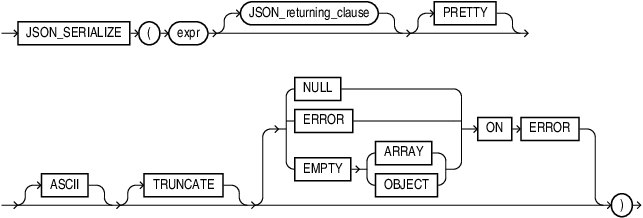JSON_SERIALIZE
Syntax
Purpose
json_serialize takes JSON data of any SQL data type (JSON, VARCHAR2, CLOB, or BLOB) as input and returns a textual representation of it. You typically use it to transform the result of a query.
You can use json_serialize to convert binary JSON data to textual form (CLOB or VARCHAR2), or to transform textual JSON data by pretty-printing it or escaping non-ASCII Unicode characters in it.
expr
expr is the input expression. Can be any one of type JSON, VARCHAR2, CLOB, or BLOB.
JSON_returning_clause::=
You can use the JSON_returning_clause to specify the return type of the function. One of VARCHAR2, CLOB, or BLOB.
The default return type is VARCHAR2(4000).
If the return type is RAW or BLOB, it contains UTF8 encoded JSON text.
PRETTY
Specify PRETTY if you want the result to be formatted for human readability.
ASCII
Specify ASCII if you want non-ASCII characters to be output using JSON escape sequences.
TRUNCATE
Specify TRUNCATE, if you want the textual output in the result document to fit into the buffer of the specified return type .
JSON_on_error_clause::=
Specify JSON_on_error_clause to control the handling of processing errors.
ERROR ON ERROR is the default.
EMPTY ON ERROR is not supported.
If you specify TRUNCATE with JSON_on_error_clause, then a value too large for the return type will be truncated to fit into the buffer instead of raising an error.
Example
SELECT JSON_SERIALIZE ('{a:[1,2,3,4]}' RETURNING VARCHAR2(3) TRUNCATE ERROR ON ERROR) from dual
–-------
{"a See Also:
Oracle SQL Function JSON_SERIALIZE